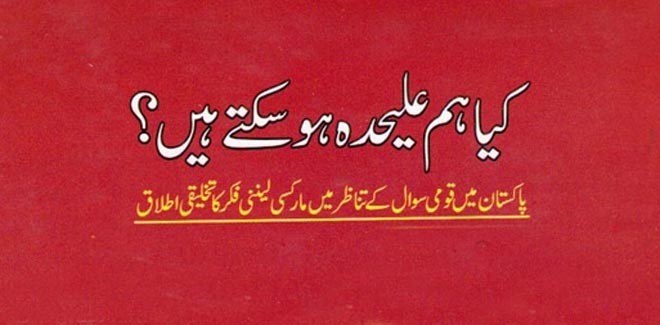
A book that debates nationalism, patriotism and nation state and raises the question of identity in Pakistan

It is often believed that patriotism and nationalism are synonyms and some even link nation state and identity questions to it too. Such notions grow into a more problematic and complex case when we treat it as a by-product of national identity. In post-colonial as well as multinational nation states like Pakistan, such questions needed some attention, but neither the state nor opposition groups handled it wisely since independence.
"Patriotism is when love of your own people comes first; nationalism, when hate for people other than your own comes first." This quote of French statesman, Charles de Gaulle, is important in many ways. A patriot always loves and respects all citizens irrespective of race, colour, religion, sect, language or ethnicity living in a nation state and his narrative is largely based on inclusiveness but a nationalist always prefers exclusiveness. One may say that a patriot always has nationalistic genes yet a nationalist might behave like a patriot.
Nation state is a modern phenomenon where fixed boundaries play a vital role and till the creation of European Union, it was considered as an anti-global phenomenon in many ways. That is why intellectuals like Albert Einstein, Allama Iqbal rightly accepted it with reservations. Iqbal called it a modern god whereas Einstein called it measles of mankind.
The book under review Kya Hum Elahda Ho Sakty Hain is a compilation of ten articles related to nationalism, identity, national question and Marxism with special reference to Pakistan. It is a critique of separatist movements of Pakistan without denouncing their multinational and multiethnic identities. The book is dedicated to the inhabitants of Mehr Garh, Muhanjo Daro and Harrapa that shows preferences of the compiler well.
Out of ten articles, two are written by Abdur Rasheed Dholka, a senior comrade from Sargodha who worked with Pakistan Mazdoor Kisan Party while two are penned by M Arfan Ch, a young comrade and former president of NSF Punjab. Two old writings are included in it; one is a 45-year-old article "Naya Pakistan" written by prominent communist, Major M Ishaq. Pakistan Tehreek-e-Insaf is using the same slogan of Naya Pakistan these days, but it has nothing in common with anti-colonial analysis of Ishaq. The other old writing included in the book is a basic document of PMKP approved in 1990 Congress. An article of late Dr Maqbool Akhtar, "Crisis of National Identity in Pakistan" is also part of the book. Abdul Satar, Shadab Murtaza and Ganpat Rai Bhail wrote each one article in this compilation.
Bhail has written about the untouchables and exposed elitist trends not only in national politics but also in provincial nationalisms, a trend that is often missed by intellectuals largely. He claimed that the number of untouchables is more than 30 million in Pakistan and they are practically out of national as well as provincial debates. They have no space in either political parties or media.
In 2006, with the help of my friend and outstanding Punjabi writer, Nain Sukh, I interviewed Aga Khan Sahotra, a leader of Punjabi untouchables (Choras, Mussalies and Muslim Sheikhs) and listened to his narrative. Such voices are still out of mainstream debate in the media. Though we have special seats in the federal as well as provincial assemblies for minorities, women, etc, we have no space for the lowest classes. It is the flipside of our politics and needs a little attention.
M Ishaq’s article is an interesting study because it was written just after the partition of Pakistan in 1972. He prophetically found similarities between ancient Brahmanical school and two-nation theory. He accepted that caste system is still prevalent in Pakistan but in non-Hindu forms. Regarding geopolitics, he said that Pakistan’s stability as well as existence would depend on its friendly relations with China. The only factor that could challenge Pakistan’s existence as a nation state is its enmity with China and our enemies know it well. Ishaq was among rare examples that had an eye not only on politics, political and economic classes but also on strategic depth. Historically and strategically, there are 9 paths (Daras) to enter our lands from south to north -- 1-Makran, 2-Melas, 3-Bolan, 4-Sakhi Sarwar, 5-Gomal, 6-Kurram and Tochi, 6-Khyber, 7-Swat and Chitral, 9-Gilgat (Silk Road).
The Durand Line practically closed all the nine paths that were used for businesses for centuries. It was part of an agenda to transform this region into a garrison state largely after March 29, 1849, a day when NWFP (now KPK), Kashmir and the Punjab were annexed. As per colonial assertion, smugglers, revolutionaries and non-state actors could use those paths; they closed it to formal businesses as well. To protect that buffer zone, Afghanistan and NWFP were created in the late 19th and early 20th centuries. The ideas of strategic depth and marshal race were coined to protect Frontier Forward policy. After more than 100 years, CPEC practically challenged that buffer zone syndrome.
Arfan Ch criticised the identity politics and emphasised on class politics, yet warned against left extremism in this regard. National Awami Party (established in 1957) was the first alliance of nationalists and communists but in 1966 it was divided into Pro-Chinese and Pro-Moscow sections and from that day nationalists and left factions in Pakistan failed to unite.
The book debates nationalism, patriotism, nation state and raises the question of identity. It may interest many political workers and researchers involved in nationalist-cum-separatist movements. Such writings are largely missing in our literature regarding the national question. For a meaningful dialogue, it has the ability to shock its readers, especially regarding politics of the lowest classes. Although, after the 18th Amendment, nationalist politics is on the decline, this phenomenon is still unheard of in our intellectual debate.
The debate regarding religion and nationalism needs attention with special reference to exclusiveness and inclusiveness.